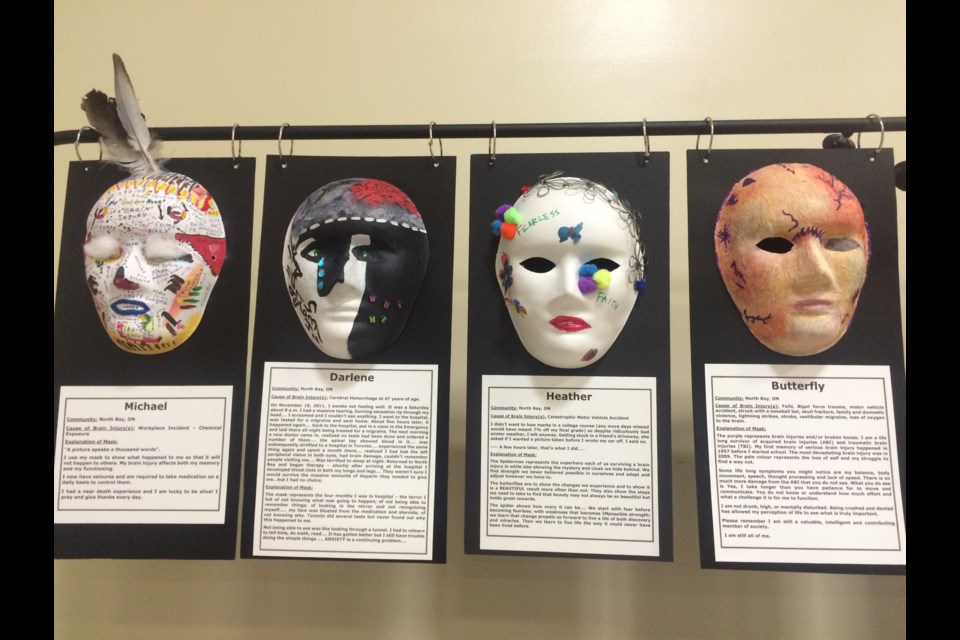When Linda (who asked that her last name not be used) was just five years old, she was hit by a vehicle, and knocked to the ground, causing a severe brain injury.
“Nobody knows what it’s like unless you’re the person being hit,” said Linda.
That was 63 years ago. Back then, at the tender age of five, there’s no telling what life might have been like if she had not sustained a brain injury.
“You’re too young to know who you are, where you’re going, or what you can do in life.”
Linda was one of a number of brain injury survivors who attended the Brain Injury Awareness Event in North Bay, looking for support.
Among the many agency displays, was a wall of masks, made by brain injury survivors. The unmasking brain injury movement gives survivors the opportunity to share a part of their journey, through words and art work.
“I wanted my message to be that even though you’ve got a brain injury, don’t let it control you, you control it. You have to fight, fight, fight all the time to keep overcoming your brain injury and to be part of society. You don’t have to be alone,” said Linda.
“Doing the mask helped me realize why I like to be in control, because control helped me get on in life. When you’re brain injured, you don’t think like most people, you don’t process as most people, and sometimes you can’t retain things as most people, so you have to try harder.”
Tracey Poole is President of the Brain Injury Association of North Bay and Area. She says the intent of the event was to increase awareness regarding acquired brain injuries and the impact they have on the survivors, caregivers, families and the community as a whole.
Poole, who was once a caregiver to a family member, says the impact on loved ones depends on the severity of the brain injury.
“It can be life altering for a loved one. It can take a toll physically, emotionally and financially. Personally, I wouldn’t have done anything differently, and I fully accept those consequences,” said Poole.
“I stumbled through and learned as I went. The biggest support network I had was my own family. Now we do offer peer support groups for survivors and caregivers. We are also an affiliate of the Ontario Brain Injury Association, and through them we participate in the province wide peer support program, which matches caregivers and survivors with mentors around the province. It involves a weekly phone call, speaking with somebody who has been through exactly what you’re going through and can offer advice. It just lets you know that you’re not alone.”
Veronica Mulligan has had 14 traumatic brain injuries throughout her life. The first injury was when she was just a year old. She fell head first down two flights of stairs in a walker. The causes of the other brain injuries are varied, including being rear ended by a drunk driver at the age of 17. In 2011 while out horseback riding, she fell off a 14 foot cliff, leaving her unconscious and broken on the trail. To this day she suffers from amnesia relating to that event.
Mulligan said it quickly became clear that she wasn’t coming back from that injury. Unable to continue work as a human resources manager, she would eventually go on to found the HEADSTRONG Organization.
“HEADSTRONG is about connecting those with traumatic brain injuries, who many times are isolated because of their symptoms, with service providers and support services in the north, specifically North Bay and area. They can then work on their journey of healing, together,” said Mulligan.
“We’re currently working on developing programs such as possibly getting Love Your Brain yoga into our area to provide six weeks of free yoga to not only those with TBI (traumatic brain injury), but also their caregivers. It’s about building community and that’s what HEADSTRONG is all about, creating a sense of community within the traumatic brain injury community and giving them a place to call home so they don’t feel isolated, they don’t feel alone.”
Representing the March of Dimes Canada as event co-host was Janet Bell who outlined some of the services it offers for its acquired brain injury outreach recovery program in North Bay.
“We have a one-to-one outreach program where we match rehabilitation workers with consumers, so those people who applied that have an acquired brain injury can work on individual goals in areas where they might be challenged. So maybe it’s memory, maybe it’s every day activities, maybe they don’t go out of the house enough, maybe they don’t get enough fitness in their life,” said Bell.
“We also have group activities where people come together to share their challenges and talk about activities in the community and support one another.”
Bells says other associations are now picking up some of the pieces like housing, and the volunteer association is there to support individuals like the Brain Tumour Foundation and the Brain Injury Association of North Bay and Area.



